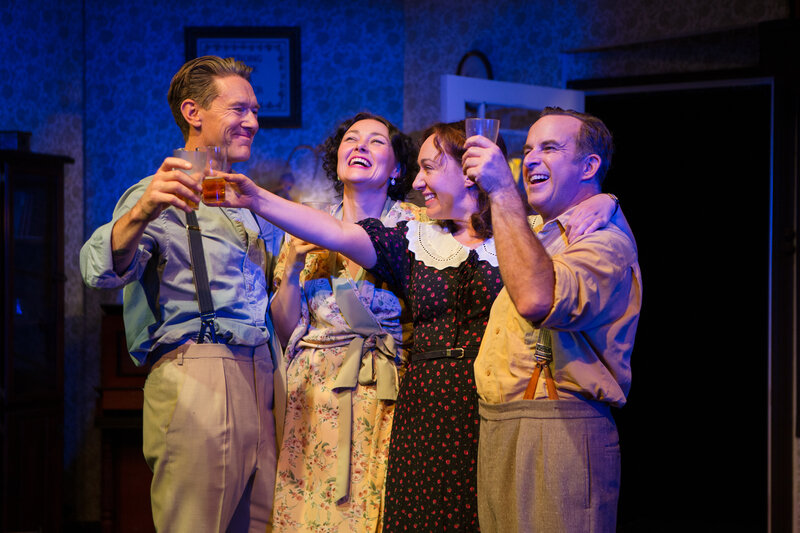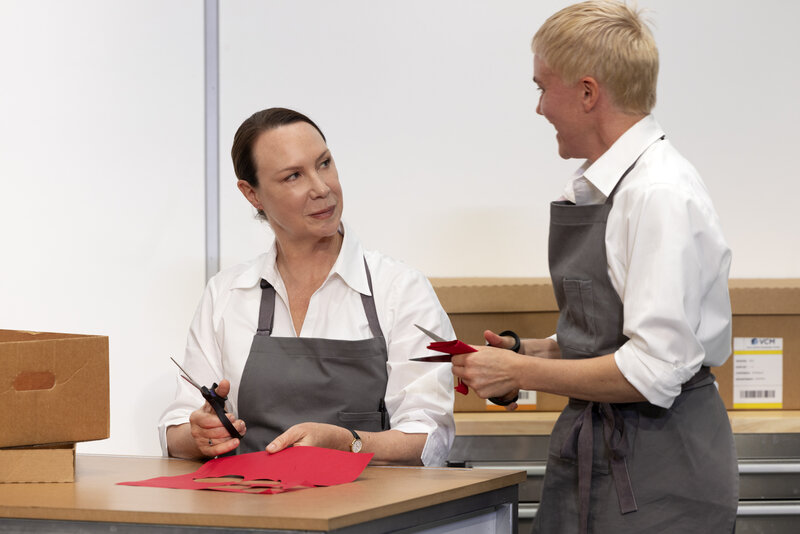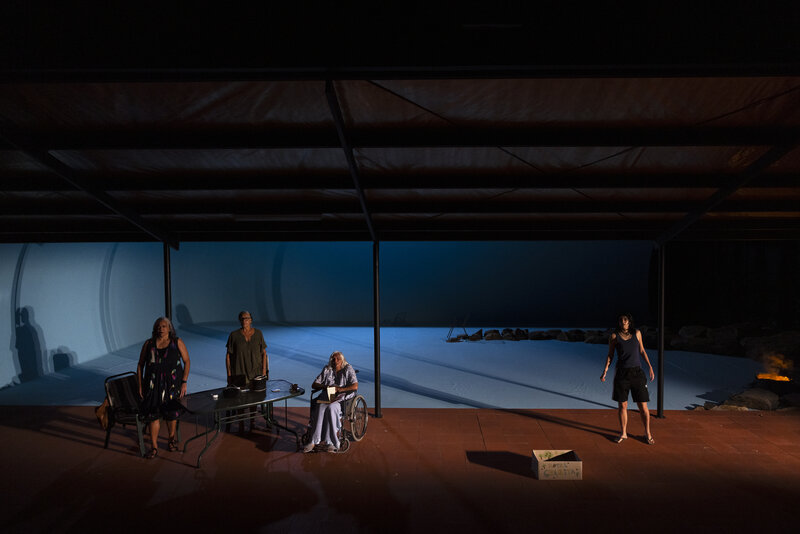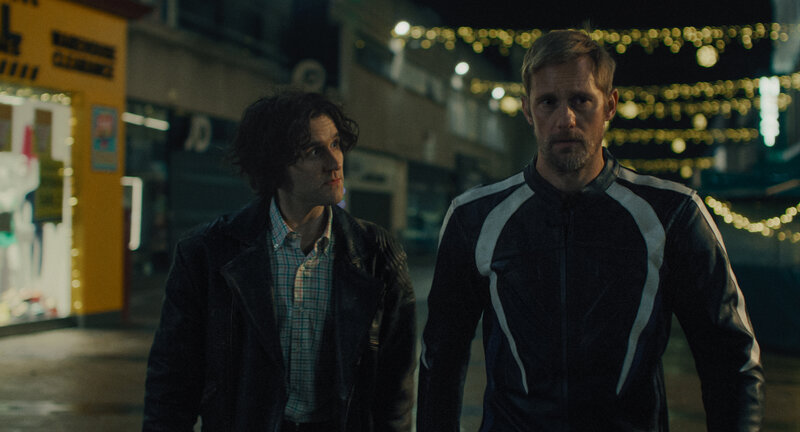In the foyer, one is posed a question to consider before entering the Antigone theatre: “How do the unwritten laws of personal conscience survive when set against the laws of a society and a nation?” Something to ponder in 2016.
Sophocles’ play Antigone, was written c. 441 BC in Athens. In it the sons of Oedipus: Eteocles and Polyneices, have killed each other in a battle over their inheritance. Eteocles died defending the city of Thebes, and so is granted an honourable burial while Polynieces is forbidden such a gesture by the order of the new ruler, Creon. Antigone, a sister to both dead soldiers, defies the decree of law to honour religious tradition, and elects to bury the rotting corpse of her brother. She is punished with live entombment for her act. Haemon, the son of Creon, who was to marry Antigone, pleads for her life, and on hearing of her suicide, too, kills himself. Eurydice, Haemon’s mother and wife of Creon, on hearing of the double tragedy elects to suicide as well. Creon is left to grieve his personal loss, continuing the curse of the House of Laius, begun with the Oedipus tragedy.
 The evolving tradition of the Greek theatre saw the 5th Century BC, flower into what some regard as a ‘Golden Age’ socially, culturally and politically, with the art and theatre linked to the action of the newly embraced practice of democracy. Democracy was a recent development of the Athenian city-state where the tyranny of an individual had before dominated. The ‘theatre’ was a public space where moral principles were able to be presented and debated to become an essential tool of that democracy. It was regarded as civic duty for the audience to attend the theatre, it underlining the active role that the citizens of the state were to engage in to create a civilisation expressing, possibly, its mutual humanity.
The evolving tradition of the Greek theatre saw the 5th Century BC, flower into what some regard as a ‘Golden Age’ socially, culturally and politically, with the art and theatre linked to the action of the newly embraced practice of democracy. Democracy was a recent development of the Athenian city-state where the tyranny of an individual had before dominated. The ‘theatre’ was a public space where moral principles were able to be presented and debated to become an essential tool of that democracy. It was regarded as civic duty for the audience to attend the theatre, it underlining the active role that the citizens of the state were to engage in to create a civilisation expressing, possibly, its mutual humanity.
Damien Ryan has adapted the play of Antigone, for Sport For Jove (SFJ), to present a contemporary view of the details of the original play, and with ease has found a way for today’s audience to recognise and identify the parallels to their own world, even though some thousands of years apart – highlighting the tragedy of our species, the Sapien, who has long had the knowledge on the ‘right’ way to live but, apparently, not the will of enlightened action to do so. Sophocles and Antigone offered a way to live in 441 BC, in the new democracy of Athens. Mr Ryan and his Antigone offers a contemporary exposition for us to regard on how we still elect to live in 2016 AD, in the contemporary democracy of Australia.
The costuming of the production is of today and the setting (both, by, Melanie Liertz) with a lighting design by Matt Cox, conjures, disturbingly, images of the war in today’s Middle East – it, looking like destroyed buildings translated from images seen on our television, tonight, of the Middle East conflict – of Aleppo, for instance. It is directed with assured deliberation by Damian Ryan and Terry Karebelas.
In this adaptation of Antigone, the predicament of a sister been forbidden to bury a brother, and her decision in defiance of a law, that represents the state’s power, is vividly presented as an everyday human conflict and empathy, and is a vital live and sensitive issue of conscience – particularly when Mr Ryan introduces the title of ‘terrorist’ for Polyneices, and talks of democracy that may be coming ‘tomorrow’ – are we still ruled by tyranny? – the clash between the two viewpoints of political expediency versus humanity is at the clear centre of this experience.
The adaptation remains faithful to the original play we know, although, there is an extension of emphasis in the shorter second act where Mr Ryan and Karebelas highlight the grief of a father, Creon, for his son, Haemon, with a physical set of images recalling a kind of pieta (with instead of the mother and son, rather, featuring a father and son), that seemed, to me, to shift the emphasis from the tragedy of Antigone and her defiance. The second act did not seem to have the same steady clarity of message that the first act had.
The ensemble of actors gathered by Sport For Jove for Antigone is strong throughout, all of them harnessed with the keen sense of the ambition of the production and has the focused commitment to deliver the intentions with passionate energy. The clash between Antigone and Creon is vigorously created by William Zappa and Andrea Demetriades, the argument of their differing points-of-view having a clarity and manipulative intellectual and emotional power enough, to provoke one to see the logic of either argument – we moved from one side of the argument to the other. Joseph Del Re, as Haemon, has a particularly thrilling debate with Mr Zappa, and Deborah Galanos, as Eurydice, has a marvellously powerful scene of despair (and courage) in the late part of the play. Whilst Anna Volksa, as the blind Tiresias, gives a finely judged performance of wit and cynical insight, tantalising the audience to pay strict attention to all her utterances. Janine Watson, as the soldier/Sentry provides, further, in Mr Ryan’s adaptation of the play, some comic relief with an expert energy and sharpness of intelligence. Louisa Mignone (Ismene), Fiona Press (Chorus Leader), Thomas Royce-Hampton (who also provides tympani accompaniment), Marie Kamara and Elijah Williams make contributions of detail and impact.
 Antigone reflects and confirms the muscular and intelligent consistency of Sport For Jove, who, whether it is the adaptation of the older classics: Antigone and The Taming of the Shrew, for instance; or straight forward revival of contemporary classics: Of Mice and Men, or Away; or contemporary translation: Three Sisters; they create relevant, contemporary new Australian plays/productions for their audiences without gimmick and with respectful integrity for the original and its writer’s intent.
Antigone reflects and confirms the muscular and intelligent consistency of Sport For Jove, who, whether it is the adaptation of the older classics: Antigone and The Taming of the Shrew, for instance; or straight forward revival of contemporary classics: Of Mice and Men, or Away; or contemporary translation: Three Sisters; they create relevant, contemporary new Australian plays/productions for their audiences without gimmick and with respectful integrity for the original and its writer’s intent.
It has been a long time since I have seen an attempt to stage a Greek play on one of our main stages. The last, in Sydney, I can recall is that of the Old Tote, in 1970, when it presented Tyronne Guthrie’s production of Oedipus, with costume and mask by Yoshi Tosa – it, an indelible memory of the primal power of that theatre form.
Make sure you catch this work. Who knows when we may see another ‘Greek’? Then, again, the Sydney Theatre Company (STC) has had a habit of taking its lead from Sport For Jove in its choice of programming : last year, it took a lead from the prize winning curation from SFJ with Cyrano de Bergerac; and their new season has taken the cue from two of this year’s works from SFJ: Away and Three Sisters. There are leaders and there are followers.
It is great to see that this production is touring, try to catch it. It may be a ‘civic duty’ particularly relevant in Canberra!?
Company: Sport For Jove (SFJ) and the Seymour Centre
Venues and dates:
Reginald Theatre, at the Seymour Centre, Chippendale, 6 – 22 October;
Canberra Theatre Centre 27 – 29 October;
Riverside Theatres, Parramatta 9 -12 November 2016
Kevin Jackson
For more of Kevin Jackson’s theatre reviews, check out his blog at Kevin Jackson’s Theatre Diary

David Edwards is the former editor of The Blurb and a contributor on film and television




